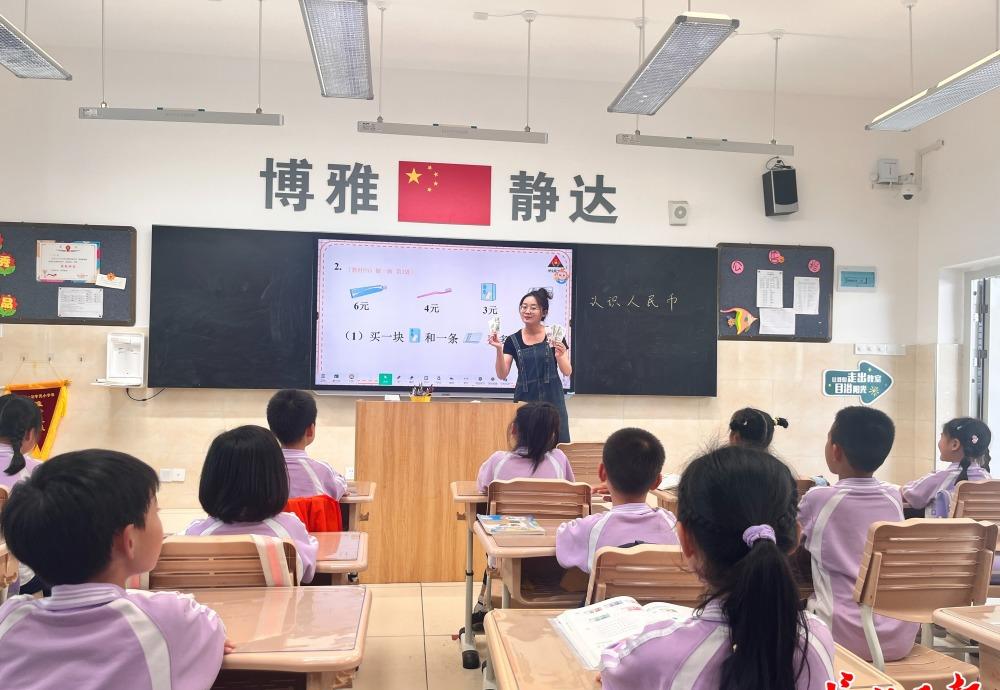"Isn't the money in the phone? "More and more children don't know money anymore
Hunan Daily
2024-06-02 17:31Published on the official account of the new Hunan client of Hunan Hunan Daily
"Students, think about it, if we want to buy a product of 3 yuan and 6 jiao, how should we pay for it?" On May 28, in the primary school of Wuhan No. 1 Junior High School Xueyuan Campus, Ma Xinyi, a first-grade mathematics teacher, was taking a lesson on "Understanding RMB". She asked the students to talk about the combination of "3 yuan and 6 jiao" with RMB. One student replied: "Give a piece of 3 yuan first, and then give a piece of 6 jiao." ”

In the primary school of Wuhan No. 1 Junior High School Xueyuan Campus, mathematics teacher Ma Xinyi is taking a lesson on "Understanding RMB". Photo by reporter Liu Jia
First-grade students don't know that there are no denominations of 3 yuan and 6 jiao, which makes the young teacher Ma Xinyi find it strange. In class, she took out various denominations of renminbi and asked students one by one if they had seen them. Most of the 40 students in the class have seen 100 yuan and 50 yuan banknotes, half of the students can recognize 10 yuan and 20 yuan banknotes, and more than half have never seen 1 yuan banknotes.
Around 2010, mobile payment began to spread rapidly in mainland China. According to the People's Bank of China, by the end of 2023, the penetration rate of mobile payments in mainland China will reach 86%.
The content of "Understanding RMB" in the first-grade mathematics textbook of the People's Education Edition. Photo by reporter Liu Jia
Most of the children in the first grade were born in 2016 and 2017. "They do have little money in life." Ms. Ma's colleague, Lu Lin, a math teacher with nearly 30 years of teaching experience, said that this lack of knowledge of money has become more and more obvious among the last five classes of first-grade primary school students.
Liu Shan, who lives in Wuchang, has a son who is in the first grade. Not long ago, she asked her son, "If you have two 20 yuan bills, how do you go to the store and buy a 30 yuan thing?" The son said, "You can give the boss a 20 yuan first, and then tear up another 20 yuan in half to make up 30 yuan." ”
The child's answer surprised Liu Shan very much. She realized that the child not only did not know money, but also did not know how to use it, and did not understand the concepts of "exchanging money" and "looking for money". She thought back for a while and found that the child only seemed to have seen 100 yuan of New Year's money during the Chinese New Year, and she usually couldn't find a banknote of other denominations at home.
Children who don't know money naturally lack specific understanding of "how money comes from". Parent Li Wei told reporters that when her daughter was about to enter primary school, she was hooked on "drawing blind boxes", and once asked her to buy 100 blind box toys in one go. She told her daughter, "You can't buy 100 at once, then your mother's money will be gone." The daughter thought it was very strange: "How can the money be 'spent'?" Isn't the money in the phone? Brush it and you'll have it again! ”
In the primary school of Wuhan No. 1 Junior High School, Ma Xinyi, a mathematics teacher, took the children to learn about RMB through learning tools. Photo by reporter Liu Jia
Nie Peng, a mathematics teacher at Tianyi Street Primary School, remembers that he went to primary school in 1986, and the mathematics class at that time had the content of "Understanding Yuan Jiaofen", and the teacher also told the story behind the RMB pattern. He became a teacher in 2001 and has experienced at least three optimizations of curriculum standards and textbooks, and "Understanding Renminbi" has always been an important lesson in textbooks.
Hu Hongbing, deputy dean of the School of Finance of Zhongnan University of Economics and Law, said that with the development of the times, children have fewer opportunities to contact cash, and the phenomenon of not knowing money is worth paying attention to. He believes that the renminbi is the legal tender of the mainland, and cash is still the most basic means of payment in the mainland. The lesson "Understanding the Renminbi" should still be learned by the children.
View original image 2.82M
-

"Isn't the money in the phone? "More and more children don't know money anymore -
"Isn't the money in the phone? "More and more children don't know money anymore -
"Isn't the money in the phone? "More and more children don't know money anymore